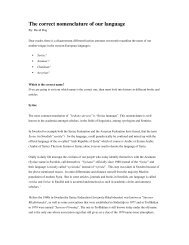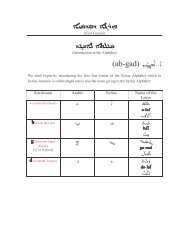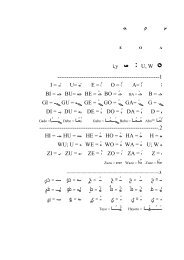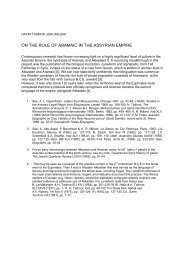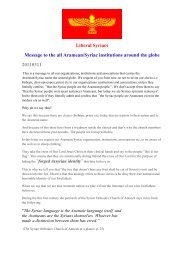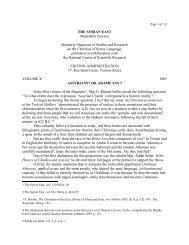The White Syrians Of Aramaean Cappadocia
The White Syrians Of Aramaean Cappadocia
The White Syrians Of Aramaean Cappadocia
You also want an ePaper? Increase the reach of your titles
YUMPU automatically turns print PDFs into web optimized ePapers that Google loves.
<strong>Of</strong> these five districts thus distinguished, the first has no connection with this<br />
article. With regard to the second, fourth, and fifth, it is doubtful whether Sobah<br />
and Rehob were in Mesopotamia or in Syria Proper. Gesenius supposes the empire<br />
of Sobah to have been situated north-east of Damascus; but places the town, which<br />
he identifies with Nesebin, Nisibis, and Antiochia Mydgoniae, in Mesopotamia; but<br />
a comparison of 2 Sam. x.6 with 1 Chron. xix.6 seems rather to imply that Rehob<br />
was in Mesopotamia, Soba and Maacha in Syria Proper; for, in the former passage,<br />
we have the Aramites of Beth-Rehob, and the Aramites of Soba, and the king of<br />
Maacah -- in the latter, Aram Naharaim = Mesopotamia, and Aram Maacah and<br />
Zobah; from which we may infer the identity of Beth-Rehob and Mesopotamia, and<br />
the distinction between this latter and Maacah or Zobah, and the Aramites of<br />
Damascus would imply the contiguity of the two states; while the expedition of<br />
Samuel "to recover his border", or "establish his dominion at the river Euphrates",<br />
during which David attacked him, would suppose a march from west to east,<br />
through Syria, rather than in the opposite direction through Mesopotamia.<br />
With regard to the origin of the name Aram, there are two Patriarchs in the early<br />
genealogies from whom it has been derived; one the son of Shem, the progenitor of<br />
the Hebrew race, whose other children Uz, Asshur, Arphaxad, and Lud, represent<br />
ancient kingdoms or races contiguous to Syria; while Uz, the firstborn son of Aram,<br />
apparently gave his name to the native land of Job, at a very early period of the<br />
world's history (Gen. x.22,23). <strong>The</strong> other Aram was the grandson of Nahor, the<br />
brother of Abraham, by Kemuel, whose brother Huz is by some supposed to have<br />
given his name to the country of Job, as it can scarcely admit of a doubt that the<br />
third brother, Buz, was the patriarch from whom the neighboring district took its<br />
name (Gen. xxii.20,21; Job, i.1, xxxii.2). But as we find the name Aram already<br />
applied to describe the country of Bethuel and Laban, the uncle and cousin of the<br />
later Aram, it is obvious that the country must have derived its name from the<br />
earlier, not from the later patriarch (Gen. xxv.20, xxviii.5&c).<br />
<strong>The</strong> classical name Syria is commonly supposed to be an abbreviation or<br />
modification of Assyria, and to date from the period of the Assyrian subjugation of<br />
the ancient Aram; and this account of its origin is confirmed by the fact that the<br />
name Syria does not occur in Homer or Hesiod, who speak of the inhabitants of the<br />
country under the name of Arimi (eis Arimois, Home. Il. B.783; Hes. <strong>The</strong>og.<br />
v.304), in connections with the myth of Typhon, recorded by Strabo in describing<br />
the Orontes; and this writer informs us that the <strong>Syrians</strong> were called Aramaei or<br />
Arimi (i.p.42, xiii.p.627, xvi.pp784-785), which name was, however, extended too<br />
far to the west or north by other writers, so as to comprehend Cilicia, and the Sacae<br />
of Scythia. (See Bochart, Geog. Sae. lib. ii, cap. 6).<br />
Herodotus, the earliest extant writer who distinctly named the <strong>Syrians</strong>, declares the<br />
people to be identical with the Assyrians, where he is obviously speaking of the<br />
latter, making the former to be the Greek, the latter the barbarian name (vii.63); and<br />
this name he extends as far south as the confines of Egypt -- placing Sidon, Azotus,



